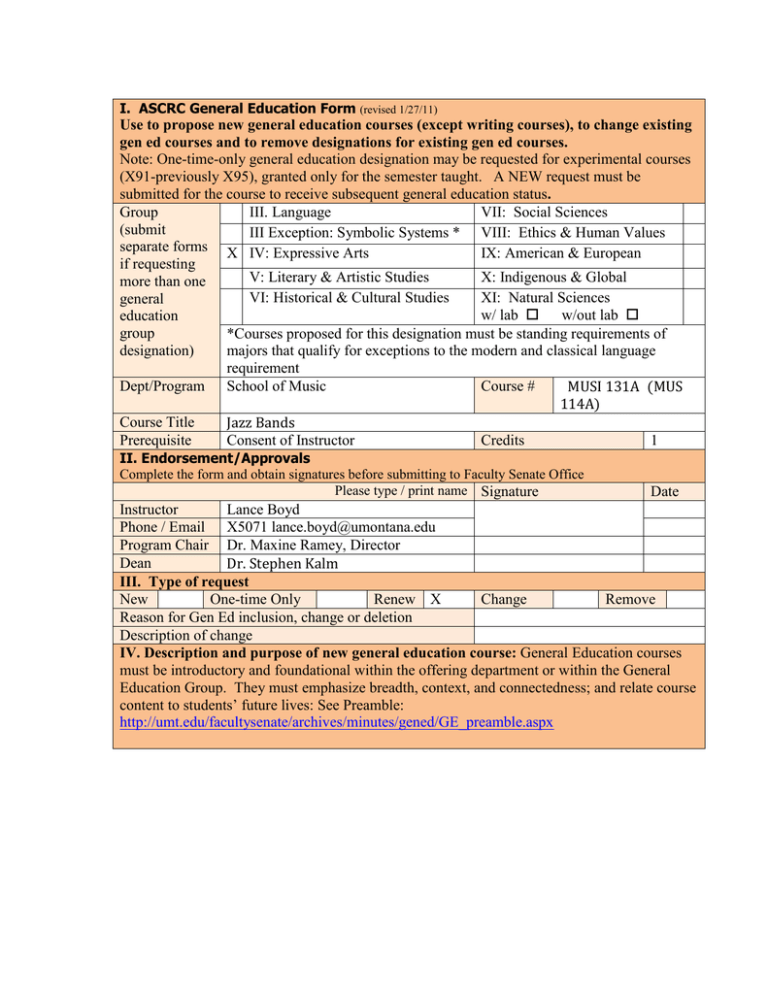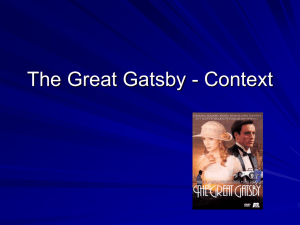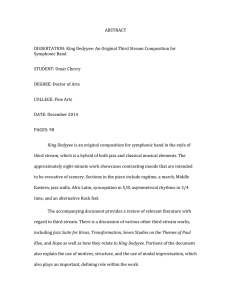Use to propose new general education courses (except writing courses),... gen ed courses and to remove designations for existing gen...
advertisement

I. ASCRC General Education Form (revised 1/27/11) Use to propose new general education courses (except writing courses), to change existing gen ed courses and to remove designations for existing gen ed courses. Note: One-time-only general education designation may be requested for experimental courses (X91-previously X95), granted only for the semester taught. A NEW request must be submitted for the course to receive subsequent general education status. Group III. Language VII: Social Sciences (submit III Exception: Symbolic Systems * VIII: Ethics & Human Values separate forms X IV: Expressive Arts IX: American & European if requesting V: Literary & Artistic Studies X: Indigenous & Global more than one VI: Historical & Cultural Studies XI: Natural Sciences general w/ lab w/out lab education group *Courses proposed for this designation must be standing requirements of designation) majors that qualify for exceptions to the modern and classical language requirement Dept/Program School of Music Course # MUSI 131A (MUS 114A) Course Title Jazz Bands Prerequisite Consent of Instructor Credits 1 II. Endorsement/Approvals Complete the form and obtain signatures before submitting to Faculty Senate Office Please type / print name Signature Date Instructor Lance Boyd Phone / Email X5071 lance.boyd@umontana.edu Program Chair Dr. Maxine Ramey, Director Dean Dr. Stephen Kalm III. Type of request New One-time Only Renew X Change Remove Reason for Gen Ed inclusion, change or deletion Description of change IV. Description and purpose of new general education course: General Education courses must be introductory and foundational within the offering department or within the General Education Group. They must emphasize breadth, context, and connectedness; and relate course content to students’ future lives: See Preamble: http://umt.edu/facultysenate/archives/minutes/gened/GE_preamble.aspx Each student enrolled in Jazz Band will be given the opportunity to learn about jazz on various levels. The goal of this course is to instill within students an appreciation for jazz, as well as teach them to perform at the highest level of musicality that they are able. During this course, students will put to use the skills they’ve obtained on their instrument, their knowledge of music history, music theory, and basic ear-training, so they may effectively perform challenging repertoire by many different composers. Students will be immersed in many different types of jazz including swing, Latin, be-bop, funk, and rock. Also, students will learn the basic of solo improvisation on their instrument, as it is fundamental to the genre of jazz. This foundational course provides the student the opportunity to acquire introductory skills in a group setting and to engage in the creative process. This “learning by doing” course offering involves the student by way of interpretive performance and critical assessment of their own work and assists in the cultivation of an appreciation of the humanities and history of different global cultures. The thrust of the course is active involvement of the student in the creation or performance of a work of art. V. Criteria: Briefly explain how this course meets the criteria for the group. See: http://umt.edu/facultysenate/documents/forms/GE_Criteria5-1-08.aspx Fundamental issues dealing with basic techniques as related to the Jazz Band medium and interpretation are studied and explored for a perspective of aural, visual and kinesthetic involvement. The student is asked to engage in the creative process by way of performance during the jazz band course and within the context of discussions with the instructor. In addition, they are asked to engage in critical assessment of their own work during rehearsals and after performances. VI. Student Learning Goals: Briefly explain how this course will meet the applicable learning goals. See: http://umt.edu/facultysenate/documents/forms/GE_Criteria5-1-08.aspx Goals: Students are asked to express themselves at each practice sessions/rehearsal; to perform the selection or technique to be learned or explored. Material presented for study represents styles and genres from a global perspective. Western and non-western composers and styles are presented as well as music from a wide varied of historical time periods. In addition, students are asked to apply a fundamental knowledge of music theory and history to their performances, the structures and forms of the artistic language to convey meaning. Students present the product of their work at several concerts throughout the academic year. Critiques and reviews are done after each performance. VII. Justification: Normally, general education courses will not carry pre-requisites, will carry at least 3 credits, and will be numbered at the 100-200 level. If the course has more than one pre-requisite, carries fewer than three credits, or is upper division (numbered above the 200 level), provide rationale for exception(s). 1-2 credit hour courses in music conform to commonly accepted practices in higher education in Schools of Music for applied learning and include skills courses , laboratory ensembles and studio work. This mode includes activities where students receive hands-on learning experience continually supervised by the instructor. Work is normally completed in the learning environment, but may include out-of-class assignments. The contact hours are be devoted primarily to practice, mastery, clarification, and application of material, rather than presentation of new or theoretical material. VIII. Syllabus: Paste syllabus below or attach and send digital copy with form. The syllabus should clearly describe how the above criteria are satisfied. For assistance on syllabus preparation see: http://teaching.berkeley.edu/bgd/syllabus.html School of Music The University of Montana Course Syllabi LANCE R. BOYD Music Building, Rm 112 Lance.boyd@umontana.edu UM Jazz Bands I & III - Music 131A/331 The UM Jazz Band is a big band jazz ensemble specializing in the performance of all styles of jazz ranging from the Swing era of the 1930’s to the contemporary styles of today. It is available to all university students regardless of major. Admission and placement are based upon audition at the beginning of the school year and the commitment is for the entire year. There are three jazz bands in the UM Jazz Band Program and each band is involved in a minimum of three public performances throughout the school year. Grading is based upon attendance and participation. Performances are mandatory and rehearsals can be missed only by permission of the instructor. Each unexcused absence will result in lowering of the grade. Jazz band members must provide their own instruments except for the large instruments like the string bass, piano, drumset and baritone saxophone. Academic Misconduct and the Student Conduct Code All students must practice academic honesty. Academic misconduct is subject to an academic penalty by the course instructor and/or disciplinary sanction by the University. All students need to be familiar with the Student Conduct Code. The Code is available for review online at www.umt.edu/SA/VPSA/Index.cfm/page/1321 Please note: Approved general education changes will take effect next fall. General education instructors will be expected to provide sample assessment items and corresponding responses to the Assessment Advisory Committee.

